
Genesis GV60 review

Introduction
Genesis is a brand you may be unsure of. It has not been around for very long, but finds its roots in the form of its parent company Hyundai.
To cut a long story short, no matter how good its cars are, getting a brand like Hyundai to challenge Mercedes-Benz, BMW, Audi and Jaguar is next to impossible. So instead, the simple trick that several manufacturers are trying is to develop a new name and a clean slate.
Select's rating score* - 3.8 / 5
At A Glance
Nobody (other than possibly Tesla) seems to be trying harder than Genesis in terms of competing with the premium brands. If you look at the cars it makes, they look like Bentleys (and wear a similar badge) with an interior to match, at least visually.
It makes a mixture of combustion-engined and all-electric cars, most of which look the part with typically Bentley-esque ostentatiousness.
But now Genesis is gunning after plenty of other well-established models by launching a crossover SUV, the GV60.
Ironically, of all the cars Genesis makes, this one looks the least like a Bentley. This is mainly because the prominent grille is lowered, where it’s greeted by a front splitter. The space above sits in a world of blank minimalism, with two-tiered horizontal headlights seated on either side.

If you squint, you could be forgiven for thinking it had the face of an angry mouse. And, although not all of us in the office agree, most of us thought it had a stylish character, even if it was a bit odd-looking.
The side looks more like a Honda CR-V, with many lines. Its bodywork curves up and back down at the bottom between the wheel arches. Meanwhile, a sloping roofline gives the GV60 a coupe-like shape.
The rear also has a minimalist feel, with two-tiered horizontal taillights on each side, which taper towards the middle of the boot. A spoiler is fixed to the bottom of the windscreen, while there’s an indentation towards the floor to provide some shape and house the number plate. A darkened bumper sits beneath.
The GV60 certainly has the personality to take on the likes of the Volkswagen ID.4, Mustang Mach-E and Jaguar I-Pace. But does it have the quality?
Well, it’s based on the same E-GMP platform that’s brought us the Kia EV6 and the Hyundai Ioniq. That might not sound exciting, but both are excellent cars, so that’s a good start.
Key Features
Like other vehicles in the Genesis range, there’s a choice of three trims. On the GV60, the grades are called Premium, Sport and Sport Plus. And the fact that the entry-level is called 'Premium' sets the tone for what Genesis is about.

The Premium has 19-inch wheels, dual-front LED headlights, electric folding heated door mirrors, bronze interior trim, a leather steering wheel and leatherette seats. It also packs in electric front seat adjustment, electric driver lumbar support, smart cruise control with stop/start, front and rear parking sensors, and a 12.3-inch infotainment touchscreen with navigation.
Furthermore, you get a 12-inch digital instrument display, smart key and button start, a rear-view camera, rain sensors, and dual-zone climate control. But there’s more - a wireless phone charger, fingerprint sensing technology, an electric tailgate and a head-up display are also included.
That is a lot in anyone’s book.
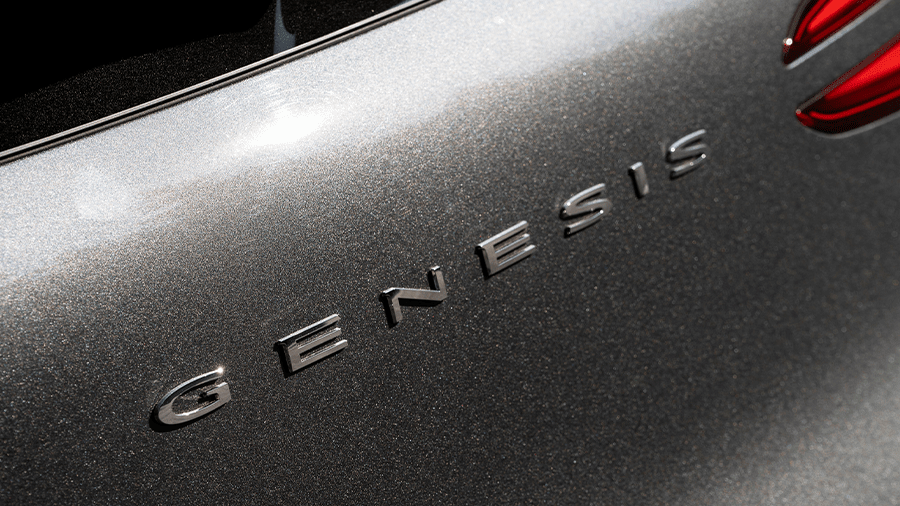
The Sport gets you all the above but with 20-inch alloys. Meanwhile, the Sport Plus gets 21-inch rims with an aluminium interior trim and Nappa leather seats.
Given that there's such little difference between each of the trims, you might be forgiven for asking why the Sport costs a fair bit more than the Premium. At the same time, the Sport Plus is substantially more than the entry-level model.
The answer? It’s all down to the powertrains. The Premium is rear-wheel drive, while the Sport and Sport Plus are four-wheel drive.
Whereas the Premium only produces 226PS, the Sport makes 314PS. Meanwhile, the Sport Plus has 429PS – and the latter has a Boost Mode which ups the power to around 482PS for about ten seconds.
The Sport Plus has 516lb/ft of torque and manages 0-62mph in 4.0-seconds, with a top speed of 146mph.
Range & Batteries
All trims come with a 77.4kWh battery – the same as on the Kia EV6 - and you can read more about how that translates in our handy guide on what kWh and kW really mean.
Unsurprisingly, the Premium trim, with only two-wheel drive and not much more than half the power of the flagship version, can go the furthest, with a range of 321 miles.

By comparison, the Sport will do 292 miles, while the Sport Plus model isn’t far behind at 289 miles. That's enough to set anyone's range anxiety to bed, but it might help to take a read through our electric car range explanation for more information.
The best all-electric cars nowadays are just getting over the 300+ mile mark, just short of rivalling our top 10 longest range electric cars of the year. So, that’s a decent achievement by Genesis, given the amount of power on offer.
Performance & Drive
We are testing the GV60 Sport Plus - and it’s lightning quick. Electric cars generally feel fast off the line as they have bucket loads of torque. But the pace goes up to 100 per cent and never seems to relent.
Nought to 62mph is dealt with in 4.0-seconds with the Boost Mode switched on. A word to the wise, you’ll want to make sure your head is already touching the headrest. It will be, within a millisecond of you pressing the accelerator pedal, if it's not.
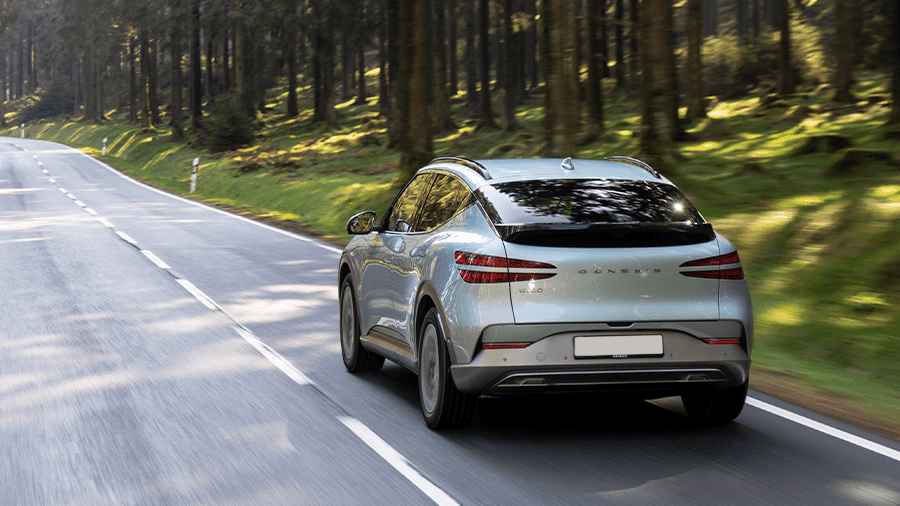
In truth, we’re not sure why you’d need the Sport Plus version apart from the obvious thrills. It is more expensive, and 314PS in the mid-range Sport model is likely to be enough for just about anyone. And, in truth, rear-wheel drive and 226PS in the entry-level Premium trim will suffice for most.
If you prefer comfort, then the entry-level might be best anyway, as the 19-inch wheels stand a chance of being more supple than the 21-inch wheels on our test car. However, it has a camera that scans the road for lumps and bumps to prepare the suspension to deal with the terrain appropriately.
We had hoped the firm setup would translate into sporty driving dynamics – and we weren’t disappointed. There is a lot of grip in the bends, and although there is a bit of body roll, the GV60 turns in keenly. It also navigates corners precisely and exits without breaking a sweat.
The limited-slip differential helps with the handling, as does the steering. The latter is light at lower speeds but firms up nicely in the corners. However, there isn't a tremendous amount of feel through the wheel.

Various driving modes sharpen up the throttle response and add some weight to the steering. Meanwhile, there’s even a Drift mode which turns off the traction control. But, of course, this isn’t recommended for those wearing white underwear!
Regenerative braking is provided, too. This technology puts energy back into the batteries under deceleration with four levels, depending on how strong you want it.
The wind and road noise are well contained, although it's inevitably more noticeable as there's no engine noise.
Charging
The Boost Mode on the Sport Plus makes you wonder if Genesis wanted to do the same for the charging speeds.
Admittedly, there are hardly any chargers in the UK that match the GV60’s capabilities. But it can recharge at an ultra-rapid 350kW – so fast that it's pretty much unheard of.
By comparison, even Tesla only recharge at 250kW.
If you can source a charger capable of 350kW, a 10 to 80 per cent charge takes just 18 minutes, so be sure to consult our guide on picking your ideal electric car charger to get the most out of every charge.
Running Costs & Emissions
No engine means no emissions, low road tax and bottom-band Benefit in Kind, so the GV60 is likely to have great appeal as a company car.

Genesis isn’t old enough to get a good picture of its reliability, although its parent company, Hyundai, has a superb reputation.
Yes, we know you’re leasing this car, but Genesis provides a five-year warranty with the GV60, with unlimited mileage. We only mention this because it shows how much faith Genesis has in its vehicles.
Interior & Technology
The interior looks futuristic and luxurious. There is plenty of silver garnish and a floating centre console, on top of which sits something called the Crystal Sphere. So now we can all experience what it's like to change gear with Mystic Meg's crystal ball! It even lights up.
Its steering wheel looks worthy of a luxury car, too, with horizontal spokes filled with buttons. Our test car also had a posh, creamy white interior colour scheme.
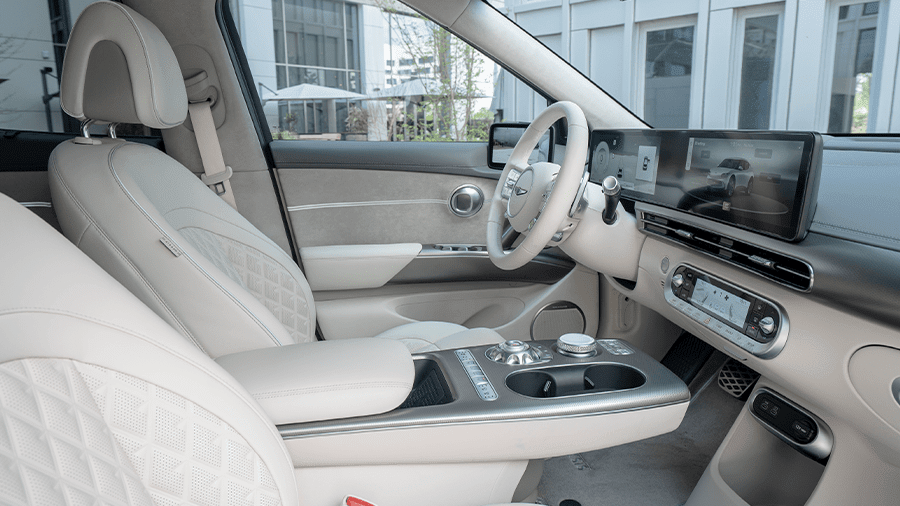
The 12.3-inch infotainment screen is clear, responsive, and reasonably easy to use. It is not a class-leading unit, but it does the job nicely. Meanwhile, the screen is neatly positioned next to a same-sized digital instrument display behind the steering wheel. It displays essential information, including navigation directions and other relevant data from the trip computer, plus media information.
There are shortcut buttons, physical volume controls and a rotary dial which helps use the system on the move. Climate control can also be adjusted from physical dials, making things easier.

The head-up display is configurable and can display the navigation directions in front of you on the windscreen, which is also helpful.
Overall, the interior looks premium, and it feels well-built. There are plush, soft-to-the-touch surfaces everywhere, and nothing feels cheap, with thin plastics kept to a minimum.
Practicality & Boot Space
Being a crossover SUV, the driving position is raised compared with driving a regular hatchback. It is not massively high, but enough to give you a decent view.
Electric adjustment makes it easy to get comfortable, while even the pillars at the rear aren’t thick. Therefore, you have a good view out of the back windows, helped by the rear-view camera and parking sensors.
Even though it’s a smallish SUV, there is a lot of space in the front, thanks to plentiful leg and headroom. In the back, legroom is generous, and even taller passengers won’t be complaining. The sloping roofline doesn’t seem to matter much, either. The middle seat does have a bit of a hump, though, so it isn’t the best for a fully-grown adult.
There is a lot of storage space, too, with two cupholders in the front, and four in the back, including one built into each of the rear doors. There is more space to put things beneath the dashboard, with a large glove compartment and a generously sized central cubby. Meanwhile, the door bins are reasonably large, too. There are also five USB sockets (four of which are USB-C).
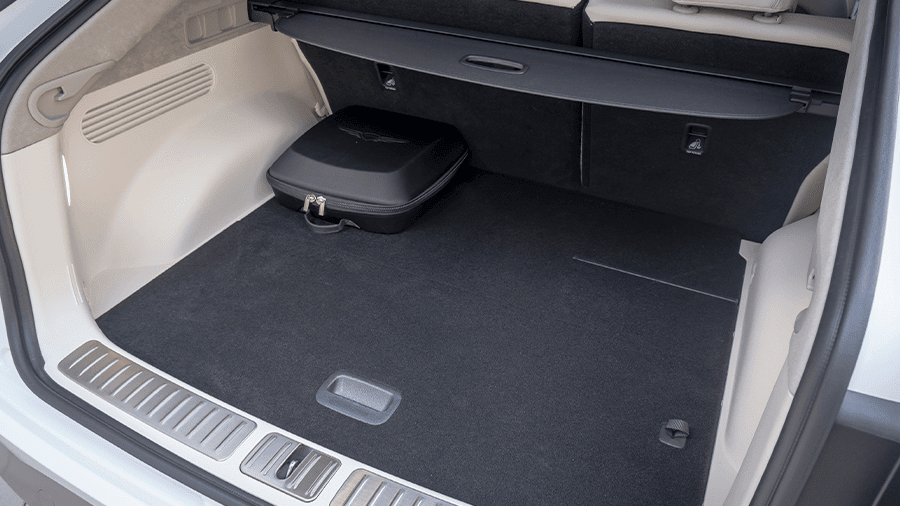
The boot space measures in at 432-litres – that’s less than the GV60’s sister cars, the Kia EV6 (490-litres) and the Hyundai Ioniq 5 (527-litres). However, all three are beaten by the Volkswagen ID.4 (543-litres) and the Skoda Enyaq iV (585-litres).
The seats fold down in a 60:40 split, increasing the boot capacity to 1550-litres. Plus, despite the GV60 having the smaller boot, you get 53-litres of extra space under the bonnet in the Premium model and 20-litres in the Sport and Sport Plus trims.
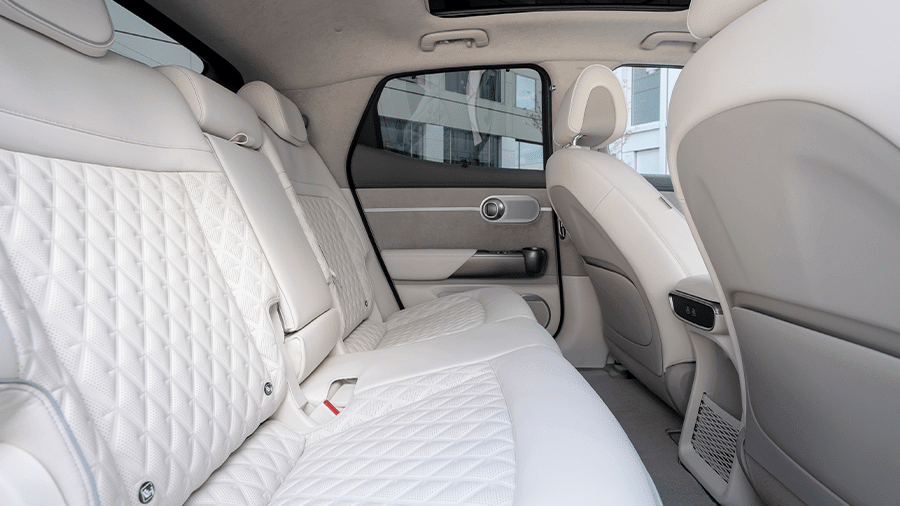
Safety
Euro NCAP hasn't yet tested the Genesis GV60. But as it shares the same platform as the Ioniq 5, its scores give an idea of the ballpark we’re looking at.
The Ioniq 5 earned a five-star rating, scoring 88 per cent for adults, 86 per cent for kids and 88 per cent for safety assists.
All GV60s get a plethora of safety equipment, including smart cruise control, rear blind-spot collision-avoidance assist and forward collision-avoidance assist. You also get lane-keeping assist, speed limit assist, lane following assist, highway driving assist, front and rear parking sensors, a rear-view camera and a rain sensor.
So, that’s a lot of assist-ance – and more safety equipment is available as an optional extra.
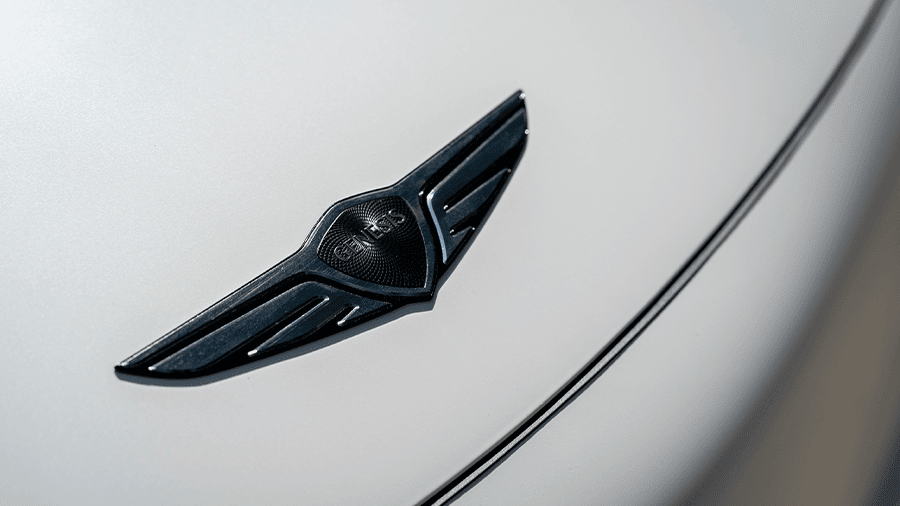
Options
A four-figure sum will get you the Innovation Pack. This tech upgrades the highway driving assist system and adds dual front LED headlamps, a blind spot view monitor, remote smart parking assist, and a surround-view camera.
A panoramic sunroof can be added for slightly less, while the inexpensive Outdoor Pack adds plugs. These enable you to use the car's battery to power electronic devices and household appliances. If you have a power cut at home, you could even run your home from your vehicle until the electricity comes back on.
If you want more comfortable seats, the four-figure Comfort Seat Pack adds an ergo motion driver’s seat with side bolsters. It also includes a cushion adjuster and adds electric lumbar support for the front passenger seat (it’s already included as standard for the driver). The front seats also get memory presets and become heated and ventilated. Meanwhile, you also get a heated steering wheel, ambient lighting, and a premium air filter.

There is also a Comfort Seat Pack for the rear seats, which makes them heated. It also adds side curtains and laminates the back glass.
For the audio enthusiast, a 17-speaker Bang and Olufsen stereo system with active noise cancelling is available for extra cash. At the same time, you can get auto-dimming exterior mirrors for peanuts.
Nappa Leather is included as standard in the Sport Plus model, but it costs a considerable sum if you want to add it in the other models. Meanwhile, coloured brake callipers are available for a relatively small amount of money.
The main body colour is white unless you're willing to pay a few hundred pounds extra. If that’s the case, you get limey-yellow, black, white, silver, dark green, red, burgundy, royal blue, mint or very dark grey.
A pretty hefty sum also gets you a choice of matte colours, including white, dark grey, dark green or burgundy.
Rival Cars
As we've covered, the Hyundai Ioniq 5 and Kia EV6 are sister cars based on the same platform. So, both provide a sensible port of call if the cost of the GV60 is off-putting.
The EV6 gets the same 77.4kWh battery, so that one’s likely to appeal if range is a priority.
The Skoda Enyaq iV is also impressive. And, if you're in the market for a performance car, then Skoda has just released the ultra-fast version, the Enyaq Coupe iV vRS.
Volkswagen’s ID.4 and the Ford Mustang Mach-E are also worth a shout. But, if you’re attracted to the Genesis for its luxury, then you’re going to be looking at the Tesla Model Y or other premium brands to match its grandeur.

Verdict & Next Steps
Overall, the GV60 is a serious contender that provides something left-field compared with some more obvious premium brands.
It is practical, spacious, luxurious, handles well and goes like hell, but it’s expensive.
On the other hand, Genesis will argue you’re paying for the luxury and the superfast performance. Plus, the marque is owned and developed by Hyundai - and its technology is proven as dependable.
There is little need to have anything but the Premium version as it includes most features that the other two trims have, but it also has the best range. And the performance of the Premium trim’s powertrain should be more than adequate unless you’re specifically seeking a performance car.
However, those who don't need the luxury of the GV60 are better off looking at the Hyundai Ioniq 5 or Kia EV6.
Where to next?
View our latest Genesis GV60 lease deal - from just £636.67 per month inc VAT**
Looking for a great leasing deal? Check out our incredible range of Special Offers
New SUV? Read our latest Car Reviews and find the right model for you
Want to know more about leasing? Take a look at our comprehensive Leasing Guides
Interested in everything motoring? Why not catch up on all the latest Car Leasing News.
*Score based on Select’s unique meta score analysis, taking into account the UK’s top five leading independent car website reviews of the Genesis GV60
**Correct as of 19/04/2023. Based on 9 months initial payment, 5,000 miles over a 48 month lease. Initial payment equivalent to 9 monthly payments or £5,730.03 Ts and Cs apply. Credit is subject to status.
{ "@context": "http://schema.org", "@type": "VideoObject", "name": "Genesis GV60 Review - Select Car Leasing", "description": "This week, we got dazzled by the Genesis GV60 – the compact SUV with some serious wheels. Genesis is the upmarket division of Hyundai, and has been offering elegant lease vehicles to the UK market since 2021. And if you're looking for a luxurious, all-electric alternative to the Audi Q4 Sportback e-tron, the Ford Mustang Mach-E or the Tesla Model Y, this GV60 should be on your list of leasing options. Next up, we’re got the Volkswagen ID.4 to check out to ⚡ Stay tuned. To lease the Genesis GV60 with us today, click this link 👉🏻 https://www.selectcarleasing.co.uk/ca... #carreview #carreviews #electriccars #electricvehicles #selectcarleasing #leasing #genesis #hyundai #genesisgv60 #gv60 #compactsuv #SUV #ElectricSUV @thesustainabledad @generatemedia_ Sections: 00:00:00 - Intro 00:00:17 - First impressions / Exterior 00:01:18 - Charging access 00:01:27 - Interior 00:01:49 - Keys 00:02:04 - Boost button 00:02:14 - Frunk 00:02:40 - Acceleration 00:02:51 - Range 00:02:55 - Charging 00:03:03 - Boot 00:03:14 - Overview / Summary", "thumbnailUrl": "https://i.ytimg.com/vi/8ggCoYsBIaU/maxresdefault.jpg?sqp=-oaymwEmCIAKENAF8quKqQMa8AEB-AH-CYAC0AWKAgwIABABGFggZShCMA8=&rs=AOn4CLDjbI-ayfTPKSZ_3N9t4RbqNtjBwg", "uploadDate": "2022-11-04T05:38:15-07:00", "duration": "PT3M55S", "embedUrl": "https://www.youtube.com/embed/8ggCoYsBIaU", "contentUrl": "https://www.youtube.com/watch?v=8ggCoYsBIaU", "interactionCount": "9032" }


















